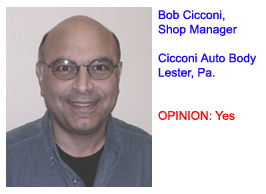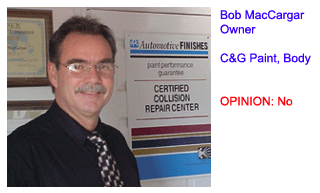
Bob Cicconi, Shop Manager
Cicconi Auto Body
Lester, Pa.
OPINION: Yes
First, the fact that color variance decks are available indicates that the colors of many vehicles in the field drift from the factory standards. I sold autobody/refinishing supplies for 20 years and worked with paint manufacturers to develop blendable matches for numerous colors. It was necessary to tint the color, spray it out, compare it to the vehicle and repeat the process as necessary until a blendable match was obtained. Painters must use the same procedures to ensure a blendable match.
Second, even if a particular color has several variants, each one must still be mixed, sprayed on a test panel and compared to the vehicle being repaired to determine which variant is the closest match. ADP’s database only includes the initial test/tint cycle in its refinish setup time, and Mitchell doesn’t include tinting or spraying test panels in its times at all.
It’s therefore necessary to include time to tint a color in addition to blending adjacent panels for proper color match. Even basic colors (such as blacks or whites) have subtle casts to them and require careful mixing, tinting and blending to avoid stark contrasts. Tinted basecoats and tri-stage colors (pearls and tinted clears) make the preparation of let-down panels, tinting and blending a necessity in almost every refinish situation.
It’s perfectly legitimate to include both tinting and blending procedures when necessary.

Bob MacCargar, Owner
C&G Paint, Body & RV
Swansboro, N.C.
OPINION: No
I have to wonder what’s on the minds of those who would think that an insurance company should pay for BOTH tint and blend on the same estimate.
First, there are so very few left in this trade who would even know how to tint if necessary. While I know there must be some technicians with the talent, it’s truly a “dying” art.
With the available color variance decks from the better paint companies, I haven’t seen a color that wasn’t a blendable match in many years. I’ve been painting (on and off) for 40 years and consider myself pretty darn sharp when it comes to getting the needed operations to complete a proper repair.
Asking for an operation that clearly isn’t going to be performed just helps us, as an industry, lose our credibility.
I hope that body shop managers and owners have the good sense to concentrate on getting paid for the truly necessary procedures and not for an operation (in this case, a combination of two operations that becomes sort of redundant) that not one in 100 painters is going to
perform.
Comments? Fax them to (330-670-0874) or e-mail them to BSB editor Jason Stahl at [email protected].













